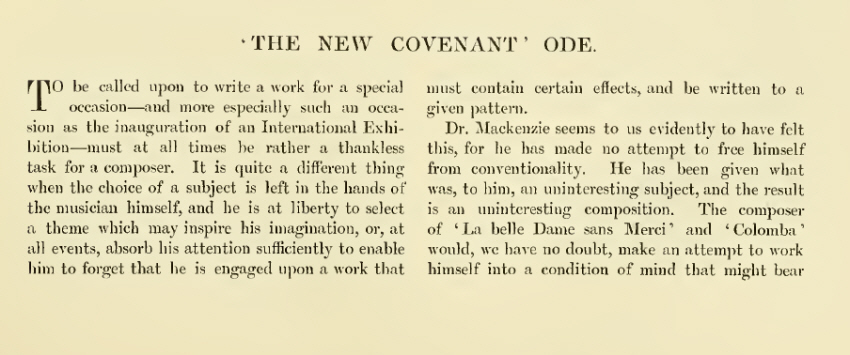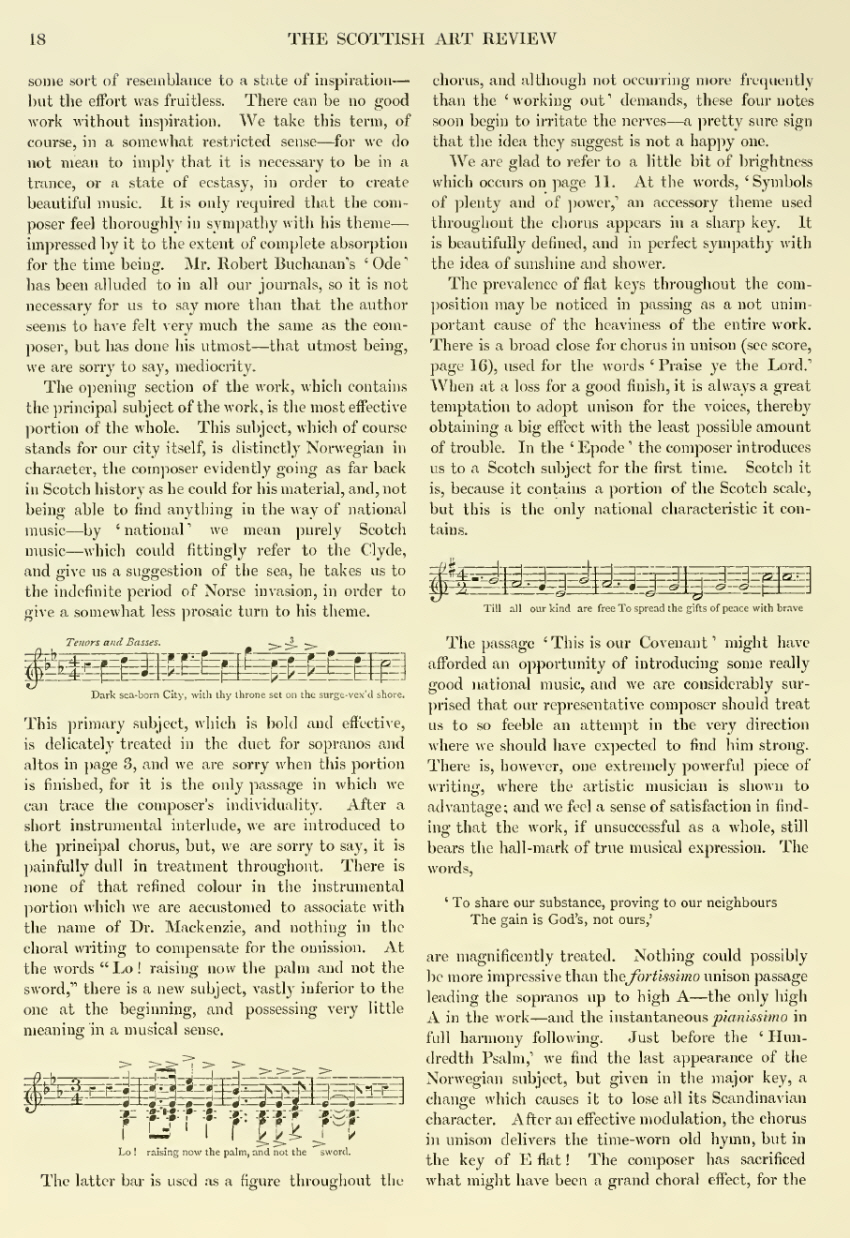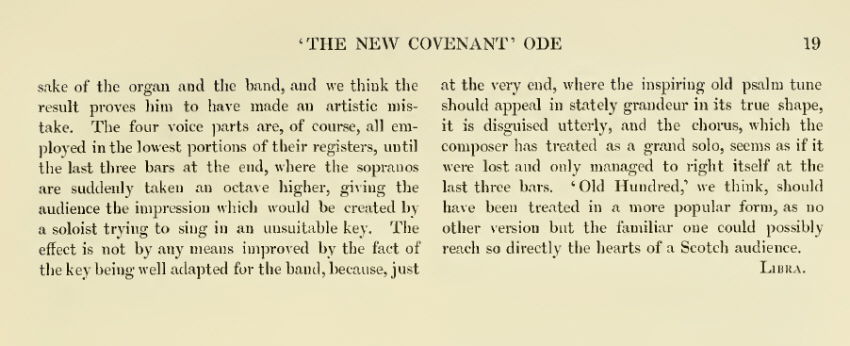ROBERT WILLIAMS BUCHANAN (1841 - 1901)
|
ROBERT WILLIAMS BUCHANAN (1841 - 1901) |
|
|
|
|
|
|
|
|
THE NEW COVENANT
The Glasgow Herald (10 December, 1887 - p.9) GLASGOW INTERNATIONAL . . . With reference to the opening ceremonial, to be performed by H.R.H. the Prince of Wales, we may mention that Mr Robert Buchanan has undertaken to write the ode to be sung on that occasion. Mr. Buchanan is a Scotchman, if, indeed, we may not say that he is a Glasgow man, and we believe the hope is that the ode may be set to music by a Scotchman. Nothing definite has yet been arranged in this direction, but there can be no hesitation as to the maker of music who should be asked to harmonise Mr Buchanan’s verses. A. C. Mackenzie is not only a Scotchman, but he is one of our foremost British composers, whose art has not yet reached its highest level. We should hope he may be asked, and that being asked he will consent, to associate himself in this way with our Exhibition. The ode will probably be sung by the members of the Choral Union. . . . ___
The Era (24 December, 1887 - p.8) MR ROBERT BUCHANAN has undertaken, at the request of the Executive Council, to write the inaugural Ode for the International Exhibition in Glasgow, and Dr. Mackenzie has agreed to compose the necessary music. The Ode will be sung at the opening of the Exhibition by the Prince of Wales next April. ___
The Glasgow Herald (21 February, 1888 - p.7) Mr Robert Buchanan’s ode to be sung at the opening of the Glasgow Exhibition—which I have seen to-day—is entitled “The New Covenant,” and contains about 75 lines. It is divided into a men’s chorus, a women’s chorus, a full chorus, then another men’s chorus, a women’s chorus, and a full chorus, the concluding number being an epode. Dr Mackenzie is anxious that the choir should then sing the Old Hundredth Psalm, to which, indeed, the spirit of the ode—essentially a song of praise for the peace and prosperity of to-day as contrasted with the turbulence and misery of the old Covenanting times—naturally leads up, and it is not likely that Mr Buchanan will offer any objection to this suggestion of the distinguished composer. In all respects “The New Covenant” is vastly superior to the majority of poetical performances written for such occasions. ___
The Scotsman (6 April, 1888 - p. 6) OPENING ODE FOR GLASGOW EXHIBITION. THE ode which has been written for the opening ceremony of the Glasgow International Exhibition by Mr Robert Buchanan, and set to music by Dr A. C. Mackenzie, is as follows:— THE NEW COVENANT. Dark, sea-born city, with thy throne But now, deep night hath taken flight, Lo, raising now the palm, and not the sword, City! whose birthright is the sea, Symbols of plenty and of power, For that first faith in Freedom’s sacred word, [EPODE.] This is our Covenant: To band for ever To turn the furrow, seeds of brightness setting To bless all gain life yields unto our labour, We swear, this hour of peace and golden weather, _____ All people that on earth do dwell, For why? The Lord or God is good; _____
The Scotsman (23 April, 1888 - p. 7) DR A. C. MACKENZIE’S NEW ODE. The book of “The New Covenant,” the Ode which Robert Buchanan and A. C. Mackenzie were commissioned to write for the opening ceremony of the Glasgow Exhibition, has just been published. The verses were printed in these columns a few weeks ago, but Mackenzie’s musical setting has only now come to hand. A brief analysis of its character and contents may interest those who are watching the career of our distinguished fellow-citizen. First, it may be noted that although the Ode is distinctly of an occasional character, and written as it were to order, both poet and musician have striven to elevate it above the common run of such pieces, and to invest it with permanent value as a work of art. Buchanan’s verses, it may be remembered, take the form of an Ode to Glasgow; but Glasgow is not addressed directly by name, but only as “Dark sea-born city;” and no little dissatisfaction has been expressed by Western criticasters who expected to find in it plentiful reference to Glasgow Green, the Clyde, the Kelvin, Broomieknowe, and all the “classic ground” of the western capital. In short, Buchanan has avoided direct local and temporal allusions. He has conceived and executed his work on a wider and more general basis. He has set in contrast the troublous times when “the Covenanter’s cry” was heard “fierce as the eagle’s shriek” with the present time of “the New Covenant,” the covenant of Peace and of Love, When countless cities echo back our cry, In this way Buchanan has worked in the religious element, and the alternate strophes become hymns of thanksgiving for the present days of peace, the words “Praise ye the Lord” being their chief burthen. This religious character is further emphasised by the concluding lines, which are simply the first two verses of the Hundredth Psalm. _____
The Scotsman (7 May, 1888 - p. 7) THE ROYAL VISIT TO SCOTLAND. ARRANGEMENTS AND PREPARATIONS IN THE WEST COUNTRY. IN connection with the visit of the Prince and Princess of Wales to Scotland for the purpose of formally inaugurating the International Exhibition at Glasgow to-morrow neither labour nor expense has been spared to give their Royal Highnesses a right loyal welcome. ... Having spent about an hour at luncheon, the Royal party will re-start, and following the route of the preceding procession, will arrive at the Exhibition about twenty minutes past two o’clock. ___
The Morning Post (9 May, 1888 - p.7) THE GLASGOW INTERNATIONAL EXHIBITION. OPENING BY THE PRINCE AND PRINCESS OF WALES. FROM OUR OWN CORRESPONDENT. GLASGOW, TUESDAY. . . . Dr. A. C. Mackenzie, Principal of the Royal Academy of Music, took his place at the conductor’s stand, and directed the performance of the Inaugural Ode. The ode, which was composed at the request of the committee by Dr. Mackenzie, is written in broad, massive harmonies, which foreshadow and ultimately lead to the “Old Hundredth Psalm.” As the music is of a more important character than is usually found in occasional odes, it is not unworthy to be received by choral societies who require short and effective works. The accompaniments are written for a wind band and orchestra, and fitly sustain the dignity of the theme selected by the poet, Robert Buchanan—the contrast of the Old and the New Covenant. The performance of the Glasgow Choral Union was all that could be desired for attack, precision, and tunefulness. Dr. Mackenzie may be congratulated upon the successful production of his work. Whatever may be said about the character of the ode, on this occasion it was illustrated by nature in a remarkable manner. At the words in the epode, “We swear this hour of peace and golden weather,” the sun, which had been temporarily obscured, suddenly burst into brilliant light, and enhanced the thrilling effect of the “Old Hundredth Psalm,” which almost immediately followed the words quoted. The whole audience rose to their feet as the choir sang the psalm, moved by an impulse arising from the impressive treatment of the inaugural ode by the gifted musician and the circumstances surrounding its production. While the Royal party were engaged in inspecting the building the Artillery Band gave another selection of pieces, including “The Lost Chord,” played as a cornet solo by Sergeant Jenner, and enthusiastically encored. [Note: The full account of the Opening Ceremony from The Morning Post is available here.] ___
The Scottish Art Review (June, 1888 - pp.17-19) |
 |
 |
 |
|
There was some opposition to Buchanan’s Ode, especially to the fact that he had been paid £50 for it. Buchanan responded to the criticism in a letter to The Glasgow Herald on 8th May, 1888, which is available in the Letters to the Press section. |
 |
|
The Grand Entrance of the Main Building. More photos of the 1888 Glasgow International Exhibition on the University of Glasgow’s Library site. ___
There was another performance of ‘The New Covenant’ in Belfast on 31st October, 1894. The Northern Whig (1 November, 1894 - p.5) THE PHILHARMONIC SOCIETY. THE opening concert of the twenty-first season took place last night, and, though the weather was not inviting and it was also Hallowe’en, there was a large audience. As usual with the inaugural concert, it was miscellaneous. Yet it contained one important work that could scarcely come under that category—viz., the ode which Robert Williams Buchanan, the well-known Scottish author, wrote for the opening ceremony of the Glasgow International Exhibition in May, 1888, and which was set to music by his distinguished countryman Alexander Campbell Mackenzie. The vocal artists were Madame Clara Samuell, who sang at the Handel festival last summer, Mr. Edwin Houghton, and Mr. Plunket Greene; and there were also Miss Pauline Sant Angelo (pianist) and Herr Willy Hess (violin). There was a large muster of both band and chorus; Herr Werner was the accompanist both at the organ and pianoforte, and Mr. F. Kœller, Mus. Bac., Oxon., was in his usual place as conductor. With the loyal strains of “God Save the Queen,” by chorus and orchestra, the concert opened. _____
|
|
|
|
|
|
|